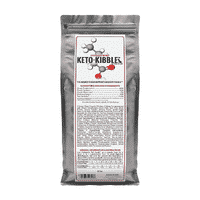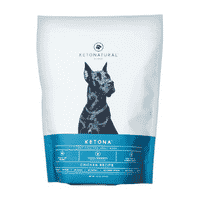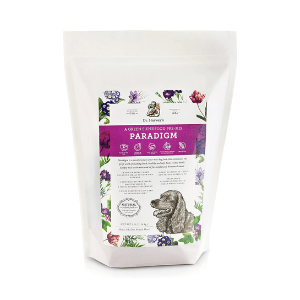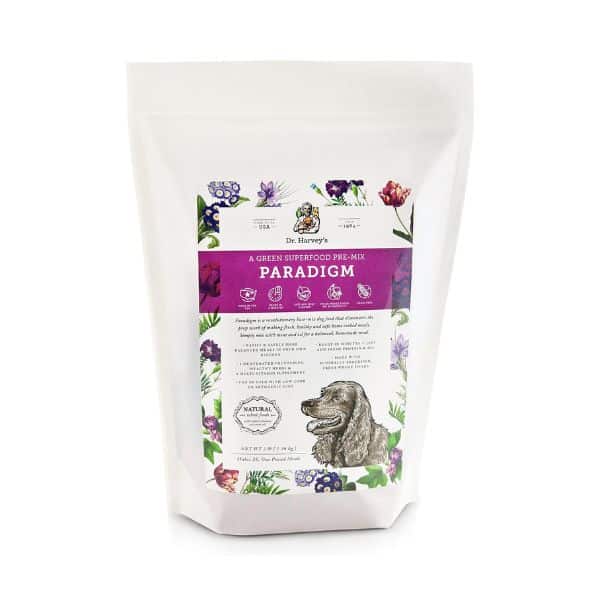Best Keto Dog Food: Is A Low Carb Diet Right For Your Dog?
When you purchase through links on our site, we may earn a commission. Here’s how it works.
The ketogenic (or keto for short) diet has become a popular fad diet in the last few years. It’s also gaining ground in the canine world. But is the ketogenic diet for dogs safe? And what do you know about the short and long-term health effects of this strict diet? I explore the research behind the keto diet and the possible health benefits and downsides for dogs. I also review the best commercial keto dog foods and answer frequently asked questions.
Table of Contents
| Winner | Runner-Up | Homemade Mix |
|---|---|---|
 |  |  |
| Ketogenic Keto-Kibble | Ketonatural Ketona | Dr. Harvey’s |
| View on Amazon | View on Amazon | View on Amazon |
| Read Review | Read Review | Read Review |
What Is A Keto Diet?

The keto diet for humans involves very low carbs, high fat, moderate protein levels, and caloric restrictions, similar to Atkins and other low-carb diets. The idea behind keto is to replace most of the carbohydrates you eat with fat. Usually, our bodies convert carbohydrates into glucose for a quick fuel source, and unused glucose is stored in the liver as glycogen.
However, with drastically low carbohydrate intake, glucose and glycogen levels are too low, so the body finds an alternate source of fuel — ketones converted from fat. When this occurs, your body has entered a metabolic state called ketosis. Ketosis causes weight loss, reduced insulin levels, and an increase in the body’s ability to burn fat.
Keto Diet For Dogs
The American Kennel Club (AKC) states that a keto diet for dogs should consist of “70% fat, 25% protein, and 5% carbs on a dry-matter basis.” A ketogenic food pyramid is used to help people better understand what they can eat and how much, like a nutritional guide for keto. For dogs, the keto food pyramid has a base of fresh meat, fish, and organ meat, followed by eggs, cheese, and oils. The smaller part of the pyramid consists of vegetables like leafy greens, broccoli, and carrots, then topped off with nuts and berries.
Keto Diet Research
Scientific evidence shows that the keto diet helps people lose weight and may have other short-term health benefits for humans. Studies have shown that a low-calorie keto diet is effective in significant weight loss in a short time and helps suppress appetite. There’s also some (but limited) evidence to suggest ketogenic diets could help treat diabetes, epilepsy, some cancers, and neurodegenerative disorders like Alzheimer’s disease.
However, evidence from human clinical trials is lacking. The Mayo Clinic points out that there’s very little evidence to show that the keto diet is effective or safe over the long term for any condition other than epilepsy.
What About Keto Research In Dogs?
A few small studies show some promising results for dogs. For example, A study of 21 epileptic dogs on a keto diet rich in medium-chain triacylglycerols (TAG) for three months found that three dogs became seizure-free, seven experienced a 50% or more drop in the frequency of seizures, and another five had reduced seizure frequency.
Other evidence comes from the nonprofit KetoPet Sanctuary, a rescue shelter for dogs with terminal cancer. Upon arrival, dogs were placed on a keto diet, and their blood was monitored to ensure they achieved ketosis. At the same time, all dogs received optimal cancer treatment (chemotherapy, surgery, etc.), and tumors were measured with PET scans. While not a cure, results showed promise, with 55% of dogs living beyond their original prognosis.
Pros & Cons Of A Keto Diet For Dogs
Given the lack of research, many veterinarians do not recommend a keto diet. Many physicians believe the keto diet is unsafe for humans long-term because of its high fat content. Side effects of very low carbs include constipation, lethargy, headaches, and more. In dogs, the primary concerns are pancreatitis, nutritional deficiencies, lethargy, diarrhea, and constipation. Still, keto for dogs has its proponents, particularly for pups with certain conditions, most notably epilepsy, cancer, and diabetes. However, many keto-for-dog fans base their support mainly on anecdotal evidence rather than scientific research.
Always consult your veterinarian before putting your dog on any special or restrictive diet. Dogs should only be on a keto diet under direct vet supervision.
A keto diet can also decrease potassium levels, known as hypokalemia. Potassium chloride (KCI) is the preferred form of potassium for people on a ketogenic diet and can be used as a salt supplement for dogs on a keto diet. It’s also used in the best electrolyte products. Potassium chloride is also used in pet food, but small quantities are unlikely to have any noticeable adverse effects. In fact, for some dogs and cats, the added potassium could have beneficial properties.
If you feed your dog a keto diet, you need to discuss hypokalemia and salt supplements with your vet. Do not attempt to address this yourself, as too much potassium can cause salt toxicity in dogs, which can also be fatal.
How Is Keto Dog Food Made?
The extrusion process can produce keto-friendly food for dogs that align with their dietary needs. This process includes:
- Mixing. Combine the selected ingredients in appropriate proportions to meet keto dietary requirements.
- Grinding. Grind the mixture to ensure uniformity and easy processing.
- Cooking. The mixture is then cooked under high temperature and pressure during extrusion. This process sterilizes the food and transforms it into a kibble-like form that dogs can eat easily.
- Cooling. After extrusion, the keto dog food is cooled to room temperature to ensure it’s safe and stable for storage.
- Packaging. The final product is packaged in airtight, moisture-proof bags to maintain freshness and prevent spoilage.
3 Best Keto Dog Foods
There are very few choices for dog food brands that make keto-specific dog food. Here are my top three picks from those that do.
Winner: Ketogenic Pet Foods Review
View on Amazon | View on Chewy
I’ve chosen Ketogenic Pet Foods Keto Kibble as my top pick for high-protein, low-carb dog food because of their nutrient-rich blends and competitive price for keto dog food. Their all-natural kibble contains a wealth of vitamins and minerals, as well as fish oil for skin and coat health and probiotics for gut health. Both formulas meet all Association of American Feed Control Officials (AAFCO) guidelines for nutritional content and are made in the USA.
Their grain-free and starch-free Keto Kibble recipe is the most popular, consisting of 60% protein, 16% fat, and 5% carbohydrates. If you’d prefer lower protein and are concerned about giving your dog grain-free food, their Keto Foundation kibble recipe contains 40% protein, 18% fat, and 5% carbs. This formula includes brown rice as the second ingredient. They have a Keto Fat Boost option that offers 57% protein, 24% fat, and 5% carbs, which is also popular. All blends get excellent customer reviews from dog and cat owners. Ketogenic also makes keto freeze-dried rabbit treats.
| Pros | Cons |
|---|---|
| Good value for keto pet food | Only available in chicken |
| Meets AAFCO guidelines for all life stages | |
| It contains fish oil and probiotics | |
| Offers a grain-inclusive option | |
| Made in the USA | |
| For dogs and cats |
Price
Runner-Up: Ketonatural Ketona Review
View on Amazon | View on Chewy
Ketonatural’s Ketona high-fat, low-carb dog food contains only natural ingredients, with whole chicken or salmon as the first ingredient. With 46% protein, 16% fat, and 5% carbohydrates, Ketona’s grain-free kibble contains no wheat, rice, soy, barley, or potatoes. Their chicken is non-GMO, antibiotic-free, and raised by American ranchers who use sustainable practices. Both formulas are fortified with essential vitamins and minerals.
Ketona meets the AAFCO guidelines for all dogs except large-breed puppies, who are expected to be larger than 70 pounds as adults. Therefore, this option is not recommended for large-breed puppies. Otherwise, it is a top keto contender and receives great reviews from most customers. Ketona also offers freeze-dried raw chicken liver dog treats with zero carbs.
| Pros | Cons |
|---|---|
| Whole antibiotic-free chicken or salmon as the first ingredient | Doesn’t meet AAFCO guidelines for large breed puppies expected to be over 70 lbs as an adult |
| No wheat, rice, soy, barley, or potatoes | Pricey |
| 30-day satisfaction guarantee | |
| Made and sourced in the USA | |
| Fortified with vitamins & minerals |
Price
- Ketona Chicken starts at $39.99 ($0.60 / Ounce)
- Ketona Salmon starts at $42.99 ($0.64 / Ounce)
Best Homemade Keto Diet: Dr. Harvey’s Paradigm Ketogenic Diet Review
Making homemade dog food can be challenging. Of course, you want to ensure your DIY recipes contain the recommended nutrients for your pup. This is where Dr. Harvey’s Paradigm makes a keto dog diet recipe simple. It offers a keto diet base that consists of a low-carb, grain-free, dehydrated blend of green leafy veggies, healthy herbs, and added vitamins and minerals. All you have to do is add hot water to the Paradigm pre-mix and let it sit for 10 minutes. Then, add freshly cooked protein (chicken, turkey, beef, fish, etc.) and stir in healthy oils to boost the fat content (coconut, flax, olive, sesame, and fish oils are all good choices).
This highly rated option offers those who want to provide a fresh keto diet a nutritionally balanced base from which to start. It’s convenient and lets you pick the best proteins and oils that suit your pup. I like that there is a trial-size bag so that you can see if your pup likes it. It is an all-natural option, and some main ingredients include green beans, broccoli, bone broth, pumpkin, kelp, alfalfa, and crushed eggshells. Only a few customers stated the bag contents were crushed on delivery, but this has good reviews overall. Watch this short video that shows how to use Dr. Harvey’s Paradigm mix to make a keto dog meal.
| Pros | Cons |
|---|---|
| A great keto base for homemade diets | Pricey |
| Nutritionally balanced | Some customers complained the contents were crushed before arrival |
| Contains superfoods & antioxidants | |
| Tasty | |
| Trial size available |
Price
- Starts from $9.99 ($29.06 / lb)
Our Methodology
We analyze hundreds of dog food brands and individual formulas to provide our recommendations for the best nutrition. Each of the following elements helps us determine the best dog food for any dietary need. Our in-depth research includes:
- Scrutinizing all ingredients included in every formula
- Having firsthand experience with our dogs for many of the foods we recommend
- Assessing the guaranteed analysis for every formula, including protein, fat, fiber, and caloric content
- Investigating the latest scientific studies on dogs’ nutritional needs and benefits of ingredients
- Researching the specific dietary needs for breed sizes and health conditions
- Reading hundreds of customer reviews
- Staying informed on every dog food recall
- Diving into every pet food brand’s history and reputation
- Keeping on top of pet food trends
Unlike many other review sites, we give unbiased reviews based on countless hours of research. Our goal is to provide our readers with the healthiest options for their pups.
Frequently Asked Questions
We know that there are many questions about keto dog diets and whether they are the right choice for our beloved pups. If you have a question that you don’t see below, ask us in the comments, and we’ll find the answer.
How To Transition My Dog To A Ketogenic Diet?
Before transitioning to a ketogenic dog diet, you must consult your vet to ensure it is appropriate and safe for your dog. Once you get the go-ahead, gradually changing their diet to this one is important. We have a food transition guide that should take place over two weeks. During that time, monitoring their stool consistency and overall health is important. If you notice any unusual behavior or digestive problems, ask your vet for advice on the next steps.
What Are The Side Effects Of The Keto Diet For Dogs?
Like any specific diet, there are several side effects of keto diets for dogs that you should be aware of. During the transition phase, some dogs experience diarrhea, constipation, and lethargy, which is sometimes called the “keto flu.” Long-term side effects can include nutritional deficiencies, muscle loss, high cholesterol, low blood pressure, electrolyte imbalances, pancreatitis, digestive problems, bacterial imbalances in the gut, acid reflux, and more. However, some dogs experience positive side effects, such as weight loss, seizure elimination, better overall health, and more.
Is A Keto Diet Safe For All Dogs?
No, a ketogenic diet isn’t safe for every dog, which is why it is crucial to discuss switching to a keto diet beforehand. A veterinarian may advise against a keto diet for dogs with certain conditions, such as pancreatitis, kidney cancer, or being underweight.
Can Puppies Eat A Keto Diet?
Most vets advise against puppies eating a keto diet because puppies need a balanced and complete diet to support their development. However, there might be some situations where it is appropriate, and your vet can advise you on a puppy keto diet plan. We have a guide on the best foods for puppies.
Not Sure Keto Is Right For Your Pup?
You have many other options if you’re looking for healthy, lower-carb dog food that’s not so high in fat. You may want to consider fresh dog food that contains all-natural, whole foods and ingredients, and some can be personalized for your dog’s dietary needs. If your goal is for your furry friend to lose weight, check out our reviews of the best dog foods for obese and overweight pups. Also, learn more about raw food diets for dogs and our top picks for raw food delivery.
Does your dog eat a keto diet? Do you use another keto dog diet product that you think I should consider for our ketogenic dog food reviews? Let us know in the comments below.
Why Trust Canine Journal?
Sally has researched and reviewed hundreds of different dog food brands and specific formulas. She’s an expert at analyzing dog food ingredients based on current nutritional guidelines and scientific studies for the healthiest food for our pups. She’s part of a team of dog specialists at Canine Journal who have over a decade of experience in researching, testing, and writing about everything you need to know to keep your pup healthy and happy.






